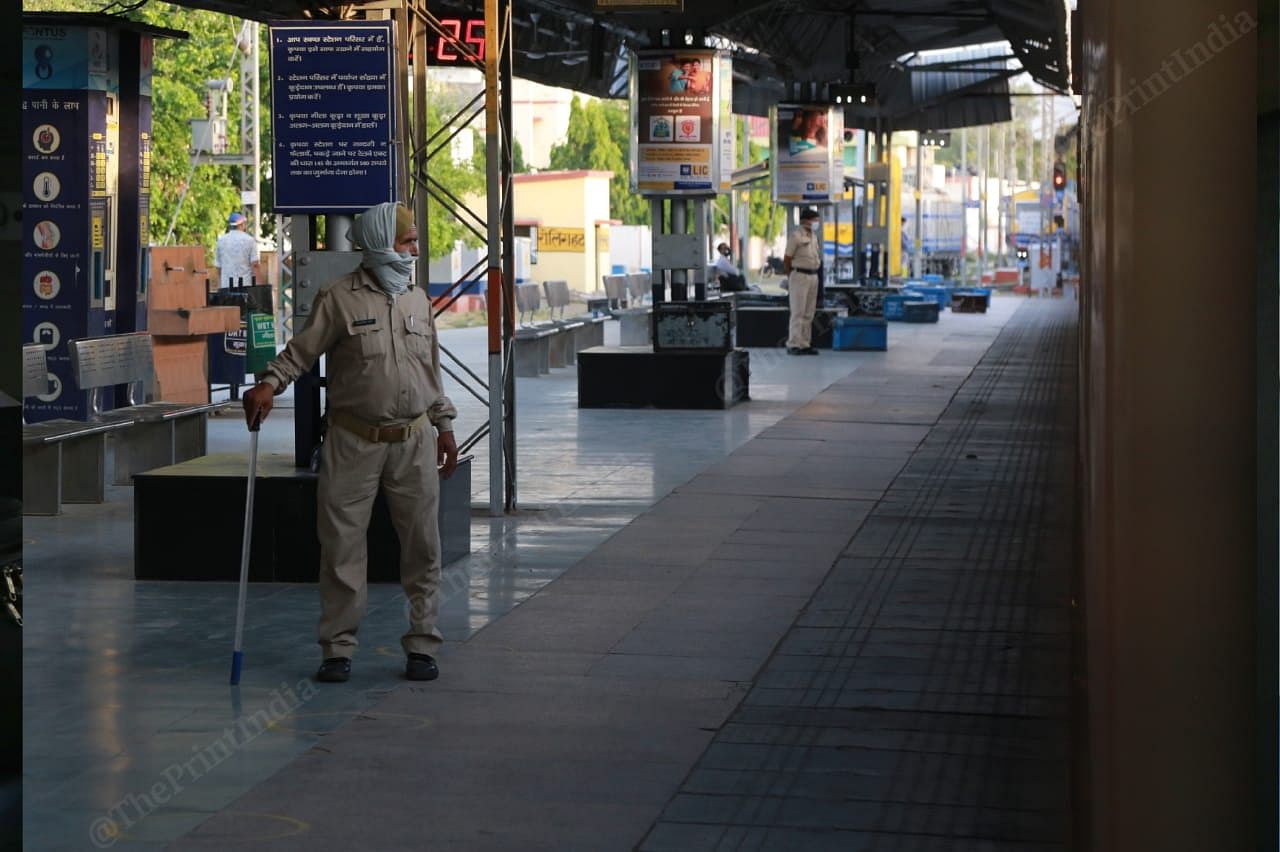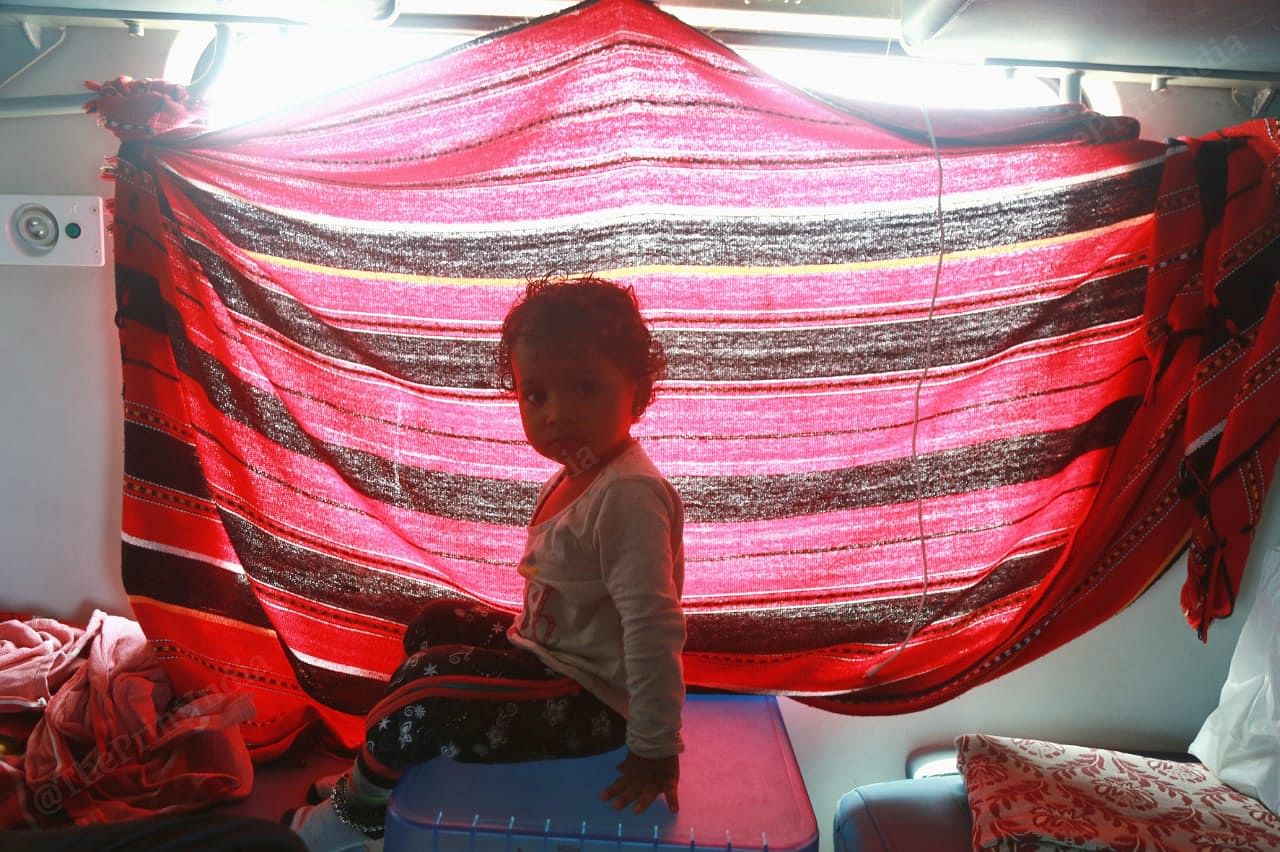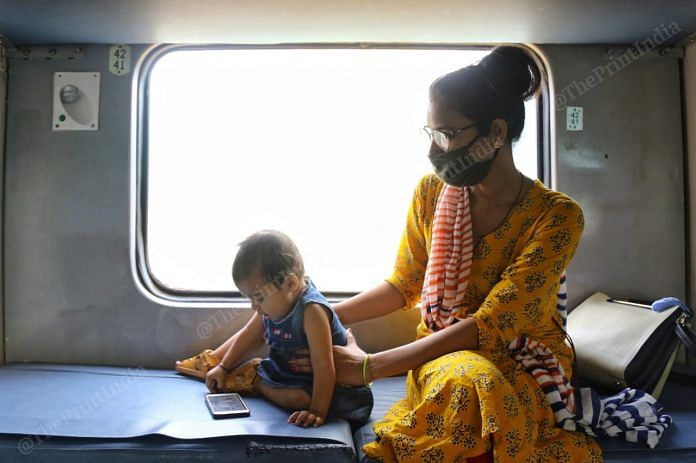India: The Indian Railways has been running 15 pairs of special trains between New Delhi and different cities on the Rajdhani routes since it partially resumed operations on 12 May after almost two months of lockdown.
All these trains, with air-conditioned coaches and a fare structure similar to regular Rajdhani trains excluding the catering charges, depart from the national capital’s New Delhi railway station.
The trains came as a new lease of life for many stranded people who were eager to go back home, to workplaces or to other destinations where they needed to be in. In the first five days alone, since 12 May, nearly 3.5 lakh passengers had travelled in these trains.
Four journalists from ThePrint, in two teams travelling to Chennai and Secunderabad in these trains, bring you an eyewitness account of what they saw and experienced.
Also read: Kerala govt slams Railways, Centre for sending train from Mumbai ‘without intimation’
No passenger screening despite rules
One can only board a train from the Paharganj side of the New Delhi station. The gate is barricaded to prevent cars from entering, but a throng of people entered through the barricade anyway. Officials at the station did their best to maintain a physical distance among people, who were made to stand in three queues, but there were too many people to manage.
The rules stipulate all passengers will go through thermal screening at the point of departure and only asymptomatic passengers will be allowed to board. At the station, however, only the luggage was screened. There was no temperature check or thermal screening. The officials didn’t try to check either if the passengers had the Aarogya Setu app downloaded on their phones.
Passengers are told to arrive 90 minutes in advance, but it took barely 15 minutes to enter the platform.
Bhim Singh, a porter, told ThePrint that he had just reached the national capital in the morning by the Shramik Special train from Jaipur. “All of us coolies were told to leave for our villages just days before the lockdown. I left for my village in Karauli district in Rajasthan on 21 March and have been there since then. I took the Shramik train from Jaipur and reached Delhi Monday morning. My temperature was checked and it was normal and I resumed work.”

Also read: States blame Modi govt’s ‘unilateral decisions’ for chaos at airports as flights resume
From Air Force officer to IAS aspirant
The platforms were buzzing with people going to various parts of India, carrying their bed-sheets, covers and bags of food, as none of these amenities are available on the trains now.
“This is the longest I’ve ever been with my family ever since I began work. Covid-19 has actually taught me what family life could mean,” said an Indian Air Force officer on the train, travelling to Bengaluru. The ground training instructor with the Air Force said the nationwide lockdown has brought him closer to his daughter.
Posted in the Bengaluru unit, he was visiting home in Noida in March to be with his wife and two children. “Who would have known it would take a virus for me to understand how much my daughter has grown up, her independent views and how I’ll have to come to terms with it,” recounted an emotional father as he ate the gobhi paratha his wife made for the two-night journey. Just then, his daughter, a 22-year-old MA in English who recently got a new job, called to say she was missing him.
A young woman in the next coach had come from Jaipur to board the train. Akansha, travelling with her one-and-a-half-year-old daughter, was studying for her B.Ed in her hometown when the lockdown was announced.
“Classes were suspended, so while I continued to stay at my parents’ house, [her daughter] needed her father, I felt,” explained Akansha, who is in her first year of B.Ed and was headed to Nagpur to be with her husband working with the RPF. “He couldn’t take time off or come here so we decided to go,” she said, adding how she couldn’t let the fear of travelling with a toddler dictate her choice.
Sanitising her daughter’s tiny hands every few minutes, she said, “I’m keeping her busy on my phone so that she doesn’t touch too many things.” The little one, of course, oblivious of the masked people around her, played with her mother’s dupatta as music played on the phone.
Lakshmi Bai (53) and Surekha (47), sisters from Bondiya, a village ahead of Nagpur, were relieved to be returning to their hometown and reuniting with their respective families. The two went to Gurugram on 11 March to visit Lakshmi Bai’s pregnant daughter. Surekha’s 24-year-old son Anurag, preparing for a a railway entrance examination, also accompanied them.
“My daughter was blessed with a baby girl and the delivery went off fine, just before the lockdown, so we were very relieved,” Lakshmi Bai recalled, as they managed to stay put and witness the baby turn two months old. However, she added, “We were to bring our daughter and the baby with us as we have a custom that daughters spend a few months in their native village once a new member arrives and everyone celebrates.” But they couldn’t risk it given the situation.
For 24-year-old IAS aspirant Raga, the suspension of coaching classes in Delhi hadn’t deterred her. Originally from Anantapur in Andhra Pradesh, she was glued to her books during the train journey and made copious notes. Raga said she booked her train ticket three times.
“We were making sure my flatmate and I leave around the same time so that one isn’t left alone. Another time, I was waitlisted, so as soon as the news of these special trains arrived, I made sure I was on my way out.” Although disappointed that she can’t get her academic doubts cleared via prerecorded online sessions of her coaching centre, she said she would rather study on her own before the revised date for the UPSC entrance exam is announced.

Also read: Mumbai migrant who sold his goats to buy IndiGo ticket will finally fly home to Bengal
Sanitisation and hygiene on board not satisfactory
The Rajdhani to Chennai halts at Agra, Jhansi, Bhopal, Nagpur, Warangal and Vijayawada before reaching Chennai. The train started at 4 pm Monday from Delhi and reached Chennai at 8:30 pm Tuesday. Stations on the way were deserted, with just a few passengers embarking and disembarking, and policemen. Everybody was seen wearing a mask and staying at arm’s length.
The trains were also running lighter, with the middle berths kept vacant to maintain social distancing.
“I have never seen the train so empty — maybe during off season, but never in May,” Ticket collector A.S. Meena told ThePrint.
The AC coaches don’t have curtains and linen, to minimise the chances of virus transmission.
The train to Chennai was, however, sanitised only twice throughout the 28-hour journey — at Jhansi and then at Vijayawada. All passengers had masks on as they read books, watched movies and talked to their families, even making plans to return to Delhi, not worrying about quarantine measures.
One such person was Srijuna Joga, an oncologist at the Rajiv Gandhi Cancer Institute & Research Centre. On her way to Vijayawada with her parents, she had not met her sons, aged three and six, for more than four months. “I was supposed to meet them in April, but could not go back due to the lockdown,” she said.
Joga needs to return to Delhi in 10 days to report back to work.
Five compartments away was 65-year-old Vinita who was going to meet her grandchildren in Bhopal for the first time. Her son Saurabh had twins in March. “I am very happy that now I am a dadi, I have been waiting to go to Bhopal since March.”
Vinita was accompanied by her 35-year-old daughter Khushboo, who would drop her and fly back to Delhi on 28 May. The mother-daughter duo carried bread and butter, chicken nuggets, chutney and chips for the journey.
In the compartment next to them were 37-year-old Gaurav Shrivastava and his wife, Juhi, who travelled from Jhansi to Delhi on 20 May to have his knee plates removed. But there was a problem with his liver function test and he was advised 15 days’ medication before returning for the surgery, so they decided to go back to Jhansi.
“What will we do in Gurgaon? There was no proper food to eat due to the lockdown. The hotel staff had all gone back home. I will only come back once the lockdown is completely over. It cost us Rs 3,500 to go by taxi from the NDLS to Gurgaon (Medicity) and then another Rs 1,500 on the way back,” he says.
A pharmacist in Jhansi’s health department, Gaurav has sent his two children in Jhansi to his sister’s house, along with his mother who is a cancer patient. “I will take a Covid-19 test when I reach and my wife will quarantine herself for two weeks,” he said.
Even as hygiene becomes ever-more vital in the battle against Covid, many passengers were unimpressed with the sanitation level on the train. “The washroom is not being cleaned. Forget that, there is no sanitiser in or outside the washroom or even in the coaches,” said Anurag, headed to Bengaluru. He said despite taking it up with the TTE, there was no response. His friend, Afzal, an employee at a construction firm, said, “There is no attendant to even address basic concerns.”
Some passengers discussed the lack of water in three washrooms and that the flush wasn’t working in a couple of them. “It is smelling, one can’t even enter the washroom,” added Anurag.
Laxmikant, who has just retired from the Army, was returning from his unit in Ranchi to Guntur. “I took a special train from Ranchi to New Delhi and then this one to Bengaluru. At Ranchi, we were screened properly and our bags were checked and sanitised before we entered the train and our temperature was checked too,” he said, adding none of this was done at the New Delhi station.
Anurag, sitting two seats away from him, added, “At a few stations, we noticed some staff spraying sanitiser spray outside the train and at the entrance doors, but what’s the point if they haven’t screened us or sanitised the train from inside.”
Some of the passengers also complained as there were no attendants. They said they didn’t know who to turn to if they needed any help during the journey.
Also read: Shramik train leaves for UP but ends up in Odisha, Railways says it’s a move to ease traffic
On arrival in Chennai and Secunderabad
In Chennai, which now has more than 11,000 cases, passengers in each bogey were asked to disembark one by one and people were made to stand in a line, maintaining physical distance at all times.
In stark contrast to what was seen at the New Delhi railway station, the Chennai Central station authorities disinfected all bags twice and provided sanitisers to people waiting in the queue. Food and water was also offered to passengers at the station.
At the exit gate, workers in PPE kits checked everybody’s temperature. However, there was no thermal screening. People were barred from sitting in their own transport and had to go in the buses provided by the state either to the free-of-cost government facility or the paid government facility at GRT Hotel.
At the Secunderabad railway station too, all passengers were screened thoroughly and their baggage sanitised.
Asked to comment on this, a spokesperson of the Indian Railways said, “The Railways is observing all the necessary protocols… All our staff has been trained.”
The spokesperson added, “No cases of lack of hygiene have come to our notice… If they do, action will be taken immediately.”
Also read: Train travel during a pandemic — masks, no pantry, frequent sanitisation and more



